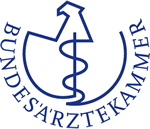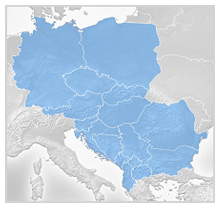About ZEVA
Participating chambers

Bundesärztekammer
German Medical Association
Herbert-Lewin-Platz 1, 10623 Berlin
+49 (0) 30 4004 56-0
info[at]baek.de
www.baek.de
Ther German Medical Association is the federation of the
17 state chambers of physicians.
The German Medical Association was established in its current form in 1947. Being granted a license to practice medicine in Germany entails compulsory membership of a chamber of physicians. All of the 357,000 professionally active physicians in Germany belong to the state chamber of physicians in the state where they work. Each state has its own chamber of physicians. The only state to have two chambers is North Rhine-Westphalia, which is divided into North Rhine and Westphalia-Lippe.
Tasks and responsibilities
Tasks and responsibilities at the national level:
- Safeguarding the professional interests of the medical profession in matters which go beyond the jurisdiction of a single state (Land).
- Contact with the Federal Government, the Bundestag and the Bundesrat (the two houses of parliament) and political parties.
- Communicating the standpoints of the medical profession on matters relating to health policy and medicine.
- Mediating the exchange of opinions and experience between the State Chambers of Physicians.
- Achieving the most uniform possible regulation of professional duties and principles for medical practise in all fields.
- Promoting continuing medical education and quality assurance.
- International relations
- Overseeing and updating the model Professional Code which regulates the ethical and professional obligations of physicians among themselves and vis-à-vis patients.
- Overseeing and updating the model speciality training regulations which define the content, duration and objectives of speciality training and specialist designations.
Tasks and responsibilities of the State Chambers:
- Professional code and supervision of the profession
- Specialty training and certification of training
- Continuing medical education
- Quality assurance
- Registration
- Representation in politics & the media
- Expert reports
- Support of public health services
- Publication of a press organ
- Cooperate with international partners
- Collaboration with health organizations
Medical education
Basic Medical Education
- The minimum duration of study for acquiring a medical degree is 6 years / 5500 hours
- The content and structure of basic medical training is defined in the Licensing Regulations for Physicians (Approbationsordnung für Ärzte – ÄAppO) which is enacted by the Federal Ministry of Health
Specialty Training
- the 17 state chambers of physicians define the precise specialist qualifications
- In order to ensure uniform specialty training regulations across the entire country, the German Medical Assembly (annual assembly of the German Medical Association) has adopted the (Model) Specialty Training Regulations to serve as a template for the state chambers of physicians
- According to the (Model) Specialty Training Regulations, specialty training “must take place within the framework of appropriately paid, full-time medical practise at an authorised institution”
- To train as a medical specialist usually takes at least five years
- This is extended by one year if specialists (for example in internal medicine) also train in a subspecialty (for example cardiology)
- The state chambers of physicians conduct the specialty examinations
- Specialty qualifications from abroad are also recognised by the state chambers of physicians
Continuing Medical Education /
Continuing Professional Development (CME / CPD)
- CME and CPD are compulsory in Germany
- The state chambers of physicians are responsible for CME / CPD regulations, which are based on the (Model) Regulations on Continuing Medical Education compiled by the German Medical Association
- physicians are required to collect 250 training points within the space of five years in order to receive a certificate of continuing medical education
